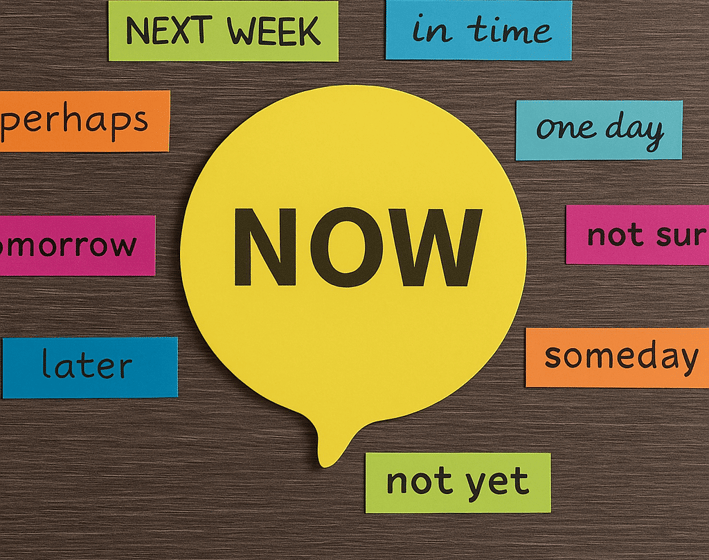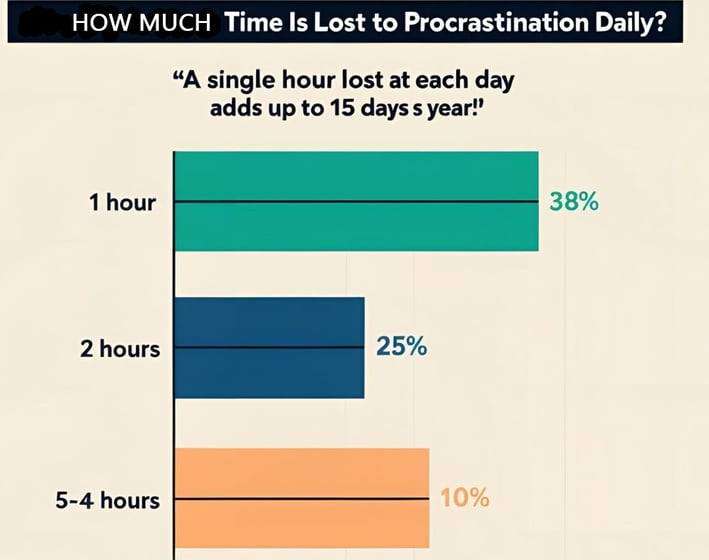Unlock Your Full Potential with Paths to Peak
7 Effective Ways to Overcome Laziness and Procrastination
"Learn 7 practical ways to beat laziness and procrastination. Stay motivated, focused, and boost your productivity with simple, proven tips."
PRODUCTIVITY
3/18/20256 min read
What is Procrastination?
Procrastination is the process of putting off an action despite being aware that you are putting yourself at risk for negative consequences. It is a classic behavioral phenomenon that can be observed in all spheres of life, such as education/work responsibilities and personal obligations. Although everyone procrastinates occasionally, chronic procrastination can affect productivity and lead to higher stress levels and less happiness overall.
Causes of Procrastination
Numerous psychological and environmental factors contribute to procrastination. The main reason for procrastination is fear of failure, individuals avoid taking action because they fear failing. Another common reason is perfectionism, where people put off even starting a task until they think they can complete the task perfectly. Equally contributing to procrastination are motivation issues, as boring or dull tasks are prone to avoidance. Even poor time management skills, unwanted distractions like social media, and decreased self-discipline lead to procrastination. Stress, low energy levels, and huge workloads can also prevent you from starting to complete your tasks on time.
Why Do I Procrastinate?
Figuring out why we procrastinate is a key first step to combating it. For example, some procrastinate as a consequence of poor self-regulation and poor prioritization skills, whilst others may do so due to deeper emotional issues, such as anxiety or low self-esteem. Avoiding stress through procrastination - delaying the task gives a momentary Relief. Moreover, the brain tends to favor short-term rewards over long-term ones, leading to procrastination. Personal triggers and habits causing procrastination can be identified and the cycle broken.
The Impact of Procrastination
Procrastination can be harmful, both mentally and physically. The most immediate of these is increased stress and anxiety, with those deadlines looming and work left unfinished. It can even lead to a lack of productivity and lack of performance since rushing the job will not produce quality work done carefully. Chronic procrastination can erode self-esteem over time and result in guilt, regret, and self-doubt. It may also damage relationships since failing to meet deadlines and deliver on promises can create frustration and disappointment with peers, colleagues, or loved ones.
The Psychology of Procrastination
Psychologists attribute the phenomenon to self-regulation failures and the brain’s natural inclination to pursue immediate pleasure rather than long-term rewards. The limbic system, which regulates emotions and immediate rewards, tends to win against the prefrontal cortex, the part of the brain that governs planning and creating objectives. This pervading bias towards caring about the now and the easy makes it far harder to ignore the small and inconsequential and do what we thought we’d rather do. Cognitive biases like the “present bias” make people devalue future outcomes in favor of instant gratification. By being aware of these psychological aspects, people can create tactics to fight procrastination and enhance their capacity to concentrate, outline, and complete assignments promptly.
7 Practical Methods to Combating Laziness and Procrastination
Procrastination or laziness are obstacles that keep us from growing personally and professionally. Postponing tasks, procrastination, or lack of motivation, whatever may be, to overcome these patterns we need self-discipline and constructive efforts. Here are seven strategies to overcome laziness and procrastination, with practical actions for implementing each one.
1. Make Sure You Have Realistic Goals
One of the biggest reasons people procrastinate is a lack of clarity and direction. Define what you want to achieve so that you are not overwhelmed by trying to tackle all tasks at once and then leaving them aside.
Actionable Steps:
SMART Goal Framework
Ensure that your goals are Specific, Measurable, Achievable, Relevant, and Time-bound. Instead of saying, “I want to be more productive,” set a specific goal, such as “I will finish my three most important tasks every day before 5 PM.”
Chunking
If your task feels overwhelming, break it down into smaller, bite-sized steps. That makes it less scary and allows you to keep up the progress.
Goal-Writing
Writing your goals down increases accountability. Use a planner or a digital application like Notion or Trello to track your goals during and after.
Establish Daily Positives
In the morning, outline your top three things to do for the day. Doing so helps you stay on track and avoid delays.
2. Make a Strong Routine to follow
Laziness is often a product of no structure. With no schedule, it’s easy to lose yourself into bad habits like playing too many video games or sleeping in.
Having a routine brings stability and reduces decision fatigue.
Actionable Steps:
Make a Daily Schedule
Plan your day ahead of time with work, exercise, fun, and sleep.
Time Block
Set aside time for individual tasks and honor them. For example, work from 9 AM to 12 PM, take a break from 12 PM to 1 PM, and work again from 1 PM to 4 PM
Begin with a Morning Routine
Kickstart your day with habits like stretching, journaling, or reading that will put you in the right mindset for the day.
Be Consistent
Habits are formed with time; therefore, try to follow them up even if on weekends or when you are less productive.
3. Minimize Distractions and Set Up a Dedicated Workspace
One of the biggest contributors to procrastination is distractions like social media, TV, or too much noise. It distracts a lot, making it hard to focus and thus reducing productivity.
Actionable Steps:
The importance of decluttering your workspace
A clean, organized workspace is ideal for focus and efficiency. Remove clutter and leave only essential tools within reach.
Website Blockers
Freedom, Cold Turkey, and StayFocusd block distracting websites and social media while you live the 9–5 dream.
Go Silent on Your Phone
You can place your phone in another room or switch to ‘Do Not Disturb’ mode to minimize distractions.
Use Noise-Cancelling Headphones
If you’re in a noisy work environment, use headphones with instrumental music or white noise to help you stay focused.
4. Implement Time Management Strategies
Poor time management is largely responsible for procrastination. Learning how to manage time effectively will help you complete every task quickly while remaining upbeat.
Actionable Steps:
Use the Pomodoro Technique
Work in intervals (25 minutes, 5-minute break, repeat). It allows other brain muscles to flex and helps in avoiding burnout.
Use the Eisenhower Matrix for Prioritization
Divide tasks into 4 quadrants: urgent & important, important but not urgent, urgent but not important, and neither. Prioritize first the tasks at hand.
Check Yourself Deadlines
Even for things that are optional and have no fixed deadline, make a deadline for yourself, which in turn will help you create urgency and commitment to the task.
Track Your Time
The automatic use of time through apps like Toggl easily saves you from waste.
5. Incentivize with Rewards and Accountability
One of the best motivations to fight laziness. An external source of encouragement could help you stay focused.
Actionable Steps:
Reward yourself
Reward yourself for finishing tasks. For example, after completing an important task, take a 10-minute break, have a snack, or watch an episode of your favorite show. Find an Accountability Partner. Share your goals with a friend, mentor, or coach who will check in on your progress and encourage you.
Visualize Success
Keep in mind the rewards of completing a task (i.e., career advancement, personal pleasure) to stay inspired
Be part of a Productivity Group
Having a group of like-minded people can help inspire and motivate you. Something like Reddit, Discord, or some accountability apps can be of help.
6. Get Over Negative Branding and Emotional Blocks
Laziness and procrastination come from self-doubt, fear of failing, and perfectionism. Overcoming such mental obstacles is at the heart of increasing productivity.
Actionable Steps:
Challenge Negative Thoughts
If you get unmotivated, you might think, “I can’t do this.” Change that to thoughts like “I will take it one step at a time.”
Embrace a Growth Mindset
Consider mistakes as opportunities to learn instead of deficiencies.
Have Self-Compassion
Don’t be hard on yourself; recognize that everyone deals with productivity issues from time to time.
Use Affirmations
Use positive affirmations like “I am capable of achieving my goals” to foster confidence and motivation.
7. Be Physically and Mentally Healthy
Poor physical or mental health leads to low energy levels, which in turn leads to laziness. Prioritize standing up and going for that run to maintain a healthy body and mind so that productivity can be achieved.
Actionable Steps:
Sufficient resting time
Obtain a minimum of 7–8 hours of sleep to maintain great focus and energy levels.
The most helpful tips for everyone to follow:
Exercise regularly. Physical activity boosts Energy and reduces Stress, forming a productive central environment. Even a 10-minute walk can help.
Eat a Balanced Diet
Too much junk food makes you not think clearly. Eat healthy carbs and protein that burn slowly and give you energy over a longer period.
Mindfulness & Meditation
Stress relief methods such as deep breathing, journaling, or meditation can promote mental clarity.
Final Thoughts
Kick Laziness and Procrastination the Curve: You Do Not Need to Change Everything Overnight — Just Incorporate Small Tricks Into Your Daily Routine. When you set clear goals, use your time wisely, minimize distractions, and pay attention to your health, you can create productive habits that promote long-term success. Try one or two of the techniques and then incorporate the rest into your daily life in the long run.






